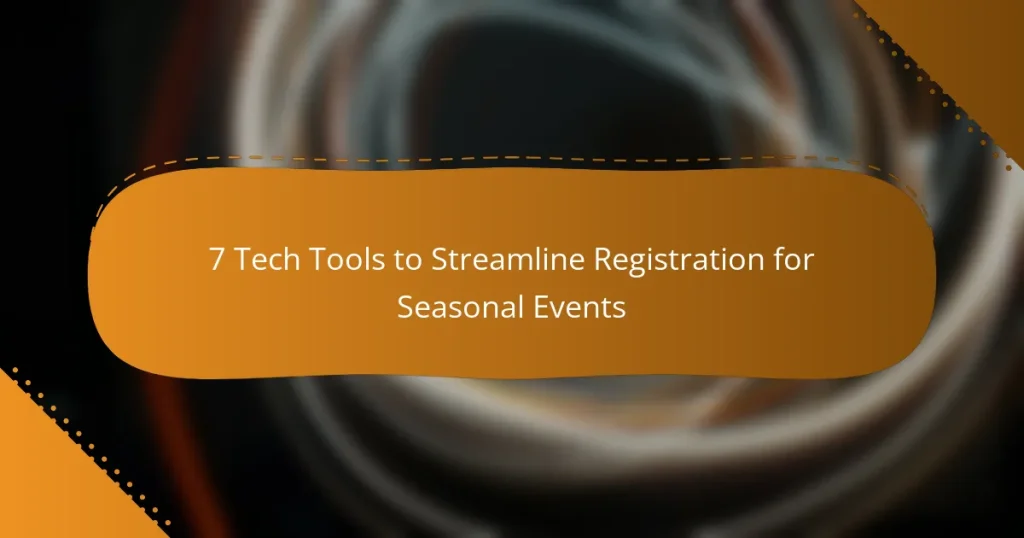Streamlining the registration process for seasonal events is essential for both organizers and attendees. By leveraging the right tech tools, you can automate key tasks, enhance user experience, and gain valuable insights, all while minimizing errors and manual work. This guide highlights seven effective tools designed to simplify event registration, ensuring a smooth and successful experience from start to finish.

What are the best tech tools for event registration in the US?
The best tech tools for event registration in the US streamline the process for both organizers and attendees, making it easier to manage registrations, payments, and communications. These platforms offer various features tailored to different types of events, ensuring a smooth experience from start to finish.
Eventbrite
Eventbrite is one of the most popular platforms for event registration in the US, known for its user-friendly interface and extensive features. It allows organizers to create customizable event pages, manage ticket sales, and track attendance in real-time.
With options for free and paid events, Eventbrite charges a service fee that varies based on ticket price and type. This platform is ideal for events of all sizes, from small gatherings to large festivals, and integrates well with social media for promotion.
Brown Paper Tickets
Brown Paper Tickets offers a straightforward approach to event registration, focusing on affordability and ease of use. It charges a low service fee per ticket sold, making it an attractive option for budget-conscious organizers.
This platform provides essential features like ticket sales, event promotion, and customer support. Brown Paper Tickets is particularly suited for community events, fundraisers, and performances, ensuring that organizers keep more of their revenue.
Ticketleap
Ticketleap is designed for event organizers who prioritize marketing and audience engagement. It features customizable event pages and tools for promoting events through email and social media.
With a simple fee structure based on ticket sales, Ticketleap is suitable for various events, including concerts, workshops, and conferences. Its analytics tools help organizers understand attendee behavior and improve future events.
RegFox
RegFox stands out for its flexibility in creating registration forms tailored to specific event needs. Organizers can customize every aspect of the registration process, from ticket types to pricing structures.
This platform charges a flat fee per registration, making it cost-effective for larger events. RegFox is particularly useful for conferences and workshops where detailed attendee information is crucial for planning.
Eventzilla
Eventzilla provides a comprehensive solution for event registration, offering features like ticketing, attendee management, and promotional tools. It is known for its affordability, with pricing options that cater to different event sizes.
Organizers can create branded event pages and utilize analytics to track sales and attendance. Eventzilla is a good choice for both virtual and in-person events, ensuring a seamless registration experience for attendees.

How do these tools streamline the registration process?
These tools simplify the registration process by automating key tasks, enhancing user experience, and providing valuable insights. They reduce manual work, minimize errors, and allow event organizers to focus on delivering a successful event.
Automated ticketing
Automated ticketing systems handle the entire ticket sales process, from initial purchase to confirmation. This reduces the need for manual entry and helps prevent errors, ensuring that attendees receive their tickets promptly.
Many platforms allow for instant ticket delivery via email or mobile apps, which enhances customer satisfaction. Look for systems that support various payment methods, including credit cards and digital wallets, to accommodate a wider audience.
Customizable registration forms
Customizable registration forms enable event organizers to tailor the information collected from attendees. This can include basic details like name and email, as well as specific preferences or dietary restrictions.
Using drag-and-drop form builders, you can create user-friendly interfaces that guide attendees through the registration process. Ensure that forms are mobile-responsive, as many users will register via smartphones.
Real-time analytics
Real-time analytics provide immediate insights into registration trends and attendee demographics. This data allows organizers to make informed decisions about marketing strategies and event logistics.
Look for tools that offer dashboards displaying key metrics, such as total registrations, ticket sales by category, and geographic distribution of attendees. Regularly reviewing this data can help identify areas for improvement in future events.

What features should you look for in registration tools?
When choosing registration tools for seasonal events, prioritize features that enhance user experience and streamline the registration process. Key functionalities include ease of use, payment processing capabilities, and integration with marketing platforms.
User-friendly interface
A user-friendly interface is crucial for ensuring that attendees can navigate the registration process effortlessly. Look for tools that offer intuitive design and clear navigation paths, minimizing the time required for users to complete their registrations.
Consider platforms that provide mobile-friendly designs, as many users will register via smartphones. A responsive layout can significantly improve user satisfaction and reduce drop-off rates during the registration process.
Payment processing options
Robust payment processing options are essential for facilitating smooth transactions. Choose tools that support multiple payment methods, including credit cards, PayPal, and local options like BGN or EUR, depending on your target audience.
Ensure that the registration tool complies with security standards, such as PCI DSS, to protect sensitive payment information. Offering a seamless checkout experience can lead to higher conversion rates and fewer abandoned registrations.
Integration with marketing tools
Integration with marketing tools allows for effective promotion and follow-up after registration. Look for registration platforms that can connect with email marketing services, social media, and CRM systems to streamline communication and enhance attendee engagement.
Utilizing integrated marketing tools can help you track attendee behavior and preferences, enabling personalized outreach and better event promotion. This can lead to increased attendance and improved participant satisfaction.

How do pricing models vary among these tools?
Pricing models for tech tools that streamline registration for seasonal events can differ significantly, affecting overall costs and budgeting strategies. Understanding these variations helps event organizers choose the right tool based on their financial constraints and expected attendance.
Free vs. paid options
Many registration tools offer both free and paid options, each with distinct features. Free versions typically include basic functionalities, suitable for small events, while paid plans often provide advanced features like custom branding, analytics, and priority support.
When considering free tools, be aware of potential limitations, such as transaction fees or reduced customer support. Paid options usually range from low monthly fees to higher annual subscriptions, depending on the features and scale of the event.
Commission-based pricing
Commission-based pricing models charge a percentage of ticket sales, making them appealing for event organizers who prefer to pay only when they earn revenue. This model can be beneficial for larger events with higher ticket prices, as it aligns costs with income.
However, commission rates can vary widely, often ranging from 2% to 10% of each ticket sold. It’s crucial to calculate how these fees will impact your overall budget, especially for events with tight profit margins.
Subscription models
Subscription models involve a fixed monthly or annual fee, providing access to the tool’s full range of features without additional transaction costs. This model is advantageous for organizers planning multiple events throughout the year, as it allows for predictable budgeting.
Subscription fees can vary based on the size of the event and the features included, typically ranging from around $20 to several hundred dollars per month. Consider your event frequency and scale to determine if a subscription model offers better value compared to pay-per-use options.

What are the pros and cons of using Eventbrite?
Eventbrite offers a user-friendly platform for event registration, making it easy to manage ticket sales and attendee information. However, while it provides significant advantages in visibility and reach, the associated fees for paid events can be a drawback for some organizers.
Wide reach and visibility
Eventbrite is known for its extensive reach, allowing event organizers to tap into a large audience. By listing events on this platform, you can attract attendees who actively search for local happenings, increasing your event’s visibility significantly.
Additionally, Eventbrite integrates with social media and email marketing tools, enabling you to promote your event across multiple channels. This can enhance your marketing efforts and help you reach potential attendees more effectively.
High fees for paid events
While Eventbrite provides valuable services, it charges fees for paid events that can add up quickly. Typically, these fees range from a few percent of the ticket price to a flat fee per ticket sold, which can impact your overall revenue.
To mitigate costs, consider setting ticket prices that account for these fees or exploring alternative platforms with lower fees. Always review the fee structure before finalizing your event pricing to ensure profitability.

What are the advantages of using RegFox for seasonal events?
RegFox offers several advantages for managing registrations for seasonal events, including cost-effectiveness and customizable features. By utilizing this platform, event organizers can streamline their processes, enhance branding, and improve the overall attendee experience.
Low transaction fees
One of the key benefits of using RegFox is its low transaction fees, which can significantly reduce overall costs for event organizers. Typically, transaction fees are a percentage of the ticket price, often falling in the range of 2-5%. This is particularly advantageous for seasonal events where profit margins can be tight.
By minimizing these fees, organizers can allocate more resources to marketing and enhancing the event experience. It’s essential to compare RegFox’s fees with other platforms to ensure you’re making a cost-effective choice.
Custom branding options
RegFox provides extensive custom branding options, allowing event organizers to create a registration page that reflects their event’s unique identity. This includes the ability to add logos, color schemes, and personalized messaging, which can enhance attendee engagement and brand recognition.
Utilizing these branding features can make the registration process feel more cohesive and professional. Consider integrating your event’s theme into the registration page to create a seamless experience for attendees, which can lead to higher registration rates.


